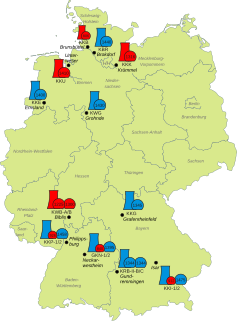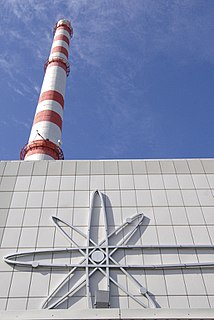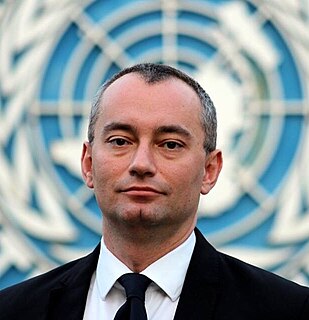
Bulgaria elects on national level a head of state - the president - and a legislature. The president is elected for a five-year term directly by the people. The National Assembly has 240 members, elected for a four-year term by proportional representation in multi-seat constituencies with a 4% threshold. Bulgaria has a multi-party system, in which no one party often has a chance of gaining power alone, and parties must work with each to form governments.

The Kozloduy Nuclear Power Plant is a nuclear power plant in Bulgaria situated 120 kilometres (75 mi) north of Sofia and 5 kilometres (3.1 mi) east of Kozloduy, a town on the Danube river, near the border with Romania. It is the country's only nuclear power plant and the largest in the region. The construction of the first reactor began on 6 April 1970.

A nuclear power phase-out is the discontinuation of usage of nuclear power for energy production. Often initiated because of concerns about nuclear power, phase-outs usually include shutting down nuclear power plants and looking towards fossil fuels and renewable energy.

The AP1000 is a nuclear power plant designed and sold by Westinghouse Electric Company. The plant is a pressurized water reactor with improved use of passive nuclear safety. The first AP1000 began operations in China at Sanmen Nuclear Power Station, where Unit 1 became the first AP1000 to achieve criticality in June 2018.

The Lungmen Nuclear Power Plant, located nearby Fulong Beach, Gongliao District, New Taipei City, is Taiwan's fourth nuclear power plant, consisting of two ABWRs each of 1,300 MWe net. It is owned by Taiwan Power Company (Taipower). It was intended to be the first of these advanced Generation III reactors built outside Japan. In 2014 construction of the plant was deferred.

Bulgaria's first commercial nuclear reactor began operation in 1974. The Kozloduy NPP operates two pressurized water reactors with a total output of 1906 MW. Construction of the Belene Nuclear Power Plant was officially terminated in March 2012, and a thermal powerplant was supposed to be built on the site.

Russia is one of the world's largest producers of nuclear energy. In 2018 total electricity generated in nuclear power plants in Russia was 202.87 TWh, 20.8% of all power generation. The installed gross capacity of Russian nuclear reactors is 31,315 MW by December 2018.

The Armenian Nuclear Power Plant (ANPP), also known as the Metsamor Nuclear Power Plant, is the only nuclear power plant in the South Caucasus, located 36 kilometers west of Yerevan in Armenia. The ANPP complex consists of two VVER-440 Model V270 nuclear reactors, each capable of generating 407.5 megawatts (MW) of power, for a total of 815 MW. The plant supplied approximately 40 percent of Armenia's electricity in 2015.

Bulgaria elected its members of the European Parliament in a by-election on 20 May 2007. It was the country's first European election, having joined the Union on 1 January of that year. The country still had 18 MEPs, no change from before the election. Until Bulgaria could hold these elections, the country was represented by MEPs appointed by the National Assembly.
Five nationwide popular referendums were held in Italy on 8 November 1987, with three questions about nuclear energy after the Chernobyl disaster, and two questions about justice. Voting day had been postponed of six months, according to the Italian Constitution, because of the snap election of spring.

Nuclear power in Taiwan accounts for 5,028 MWe of capacity by means of 3 active plants and 6 reactors, which makes up around 8.1% of its national energy consumption, and 19% of its electricity generation as of 2015. The technology chosen for the reactors has been General Electric BWR technology for 2 plants and Westinghouse PWR technology for the Maanshan Nuclear Power Plant. Construction of the Lungmen Nuclear Power Plant using the ABWR design has encountered public opposition and a host of delays, and in April 2014 the government decided to suspend construction.

Atomstroyexport is the Russian Federation's nuclear power equipment and service exporter. It is a fully owned subsidiary of Rosatom. The activities of Atomstroyexport are financially supported by the Russian government. The President of ASE Group of Companies is Alexander Lokshin.
The Kaliningrad Nuclear Power Plant is a nuclear power plant under construction 13 kilometres (8.1 mi) south-east of Neman, in Kaliningrad Oblast, Russia. It is seen as a counter-project to the plan to build the Visaginas nuclear power plant in Lithuania and is considered not only as an energy, but also as a geopolitical project. In June 2013 the construction was temporary stopped for the project to be redesigned.
Construction of the first Austrian nuclear power plant in Zwentendorf on the Danube, about 30 kilometres upstream from the capital, Vienna, began in 1972. Zwentendorf Nuclear Power Plant was designed as a boiling water reactor with a capacity of 700 MW(e), that was expected to generate about 10% of the Austrian electricity production.

The Zwentendorf Nuclear Power Plant was the first commercial nuclear plant for electric power generation built in Austria, of 3 nuclear plants originally envisioned. Construction of the plant at Zwentendorf, Austria was finished but the plant never entered service. The start-up of the Zwentendorf plant, as well as the construction of the other 2 plants, was prevented by a referendum on 5 November 1978. A narrow majority of 50.47% voted against the start-up.
The anti-nuclear movement in Russia is a social movement against nuclear technologies, largely stemming from the results of the Chernobyl incident in 1986. During the most active phase of the anti-nuclear movement, from 1988 to 1992, construction of over 100 nuclear projects were prevented on the territory of the Soviet Union. Also, the economic troubles of the 1990s led to a reduction in the number of construction projects. This deprived the anti-nuclear movement of its raison d’être. At the same time, it too was affected by financial difficulties, in particular the lack of donations, which continues to be an issue today. Since the 2000s the Russian Government embarked on highly pro-nuclear policy, with plans to invest billions of dollars in developing the nuclear industry, which leaves the movement with big challenges.

Parliamentary elections were held in Bulgaria on 12 May 2013, two months ahead of schedule. Protests had forced the resignation of the GERB government in February, leading to the election being moved up.

Boyko Metodiev Borisov is a Bulgarian politician who has been serving as the 50th Prime Minister of Bulgaria since 4 May 2017. He had previously held the post of Prime Minister on two separate occasions, from 2009 until 2013 and from 2014 until January 2017. He was also the Mayor of Sofia from 2005 to 2009.

A referendum on introducing electronic voting was held in Bulgaria on 25 October 2015 alongside local elections. Although the referendum resulted was approved by a wide margin, turnout was far below the required threshold to make its result binding.






















